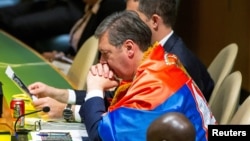UN General Assembly Passes Resolution Observing Srebrenica Genocide Remembrance Day
The United Nations General Assembly has passed a resolution on July 11, declaring an International Srebrenica Genocide Day and condemning the denial of genocide as well as the glorification of war criminals.
In favor of the resolution regarding the International Days of Commemoration and Remembrance for Srebrenica, representatives from 84 countries voted in support. This includes all EU member states and all former Yugoslav republics except Serbia.
Nineteen countries opposed the resolution: Serbia, Hungary, China, Russia, Belarus, Cuba, North Korea, Syria, Eritrea, Nicaragua, Grenada, Mali, Nauru, São Tomé and Príncipe, Antigua and Barbuda, along with a few others.
- See the complete list of countries and how they voted on the resolution here
There were 68 abstentions, including Greece, Slovakia, Cyprus, Armenia, Georgia, India, Brazil, Argentina, Mexico, Algeria, and Angola.
Countries that did not vote include Israel, Azerbaijan, Venezuela, and others.
Bećirović: A historic opportunity for reconciliation and trust
The Chairman of the Presidency of Bosnia and Herzegovina, Denis Bećirović, remarked on the resolution’s passage, stating that “no people, including the Serbian people, should be labeled as genocidal.”
“Thus, this resolution offers a new historical opportunity for reconciliation and trust. It represents a new chance for catharsis and a civilizational reckoning with those responsible for the genocide,” Bećirović emphasized in an interview with Radio Free Europe.
“This is a victory for truth and justice. The resolution has been adopted,” remarked a representative of the Srebrenica community following the resolution’s decision.
The families of genocide victims monitored the live voting through the Association “Mother’s Movement of Srebrenica and Žepa.”
This resolution has sparked significant reactions in Serbia and Bosnia and Herzegovina, where officials argue that it labels the Serbian people as “genocidal” and does not promote reconciliation in Bosnia and Herzegovina or the wider region.
Before the UN General Assembly on May 23, German Ambassador Antje Leendertse stated that “the resolution was not aimed against anyone, including Serbia, which is a full member of this organization.”
“The resolution focuses solely on the perpetrators of genocide,” Leendertse affirmed.
What did the President of Serbia say?
On the eve of his trip to New York, Serbian President Aleksandar Vučić conveyed that Serbia considers all countries that did not support the resolution as “friendly,” while those that backed it are seen as “partners.”
After the voting results were announced, Vučić held the Serbian flag at the UN General Assembly session before discarding it.
Previously, Vučić described the proposed resolution concerning Srebrenica as “extremely politicized,” asserting that it would “open Pandora’s box” and would not foster reconciliation in Bosnia and Herzegovina or the region. He called on all member states to vote against the document.
Manojlović Pintar on the Phrase ‘Genocidal Nation’
Historian Olga Manojlović Pintar stated during a Live Radio Freedom program that the document “clearly reveals the intent of its authors to create a new platform for dialogue among opposing parties.”
“My interpretation of this document is entirely contrary to the message conveyed by billboards across Serbia and Republika Srpska, which insinuate an attempt to impose a stigma of genocidality,” she explained, adding that the document aims to “prioritize the needs of families, particularly the victims.”
Billboards proclaiming “We are not a genocidal people” have appeared throughout Belgrade leading up to the UN General Assembly session on May 22.
Manojlović Pintar emphasizes that the term “genocidal people” is a category “that international law does not recognize,” yet the political elites in Serbia and Republika Srpska oppose the resolution for various other reasons.
“The ruling political, intellectual, and church elites have never truly abandoned the policies that led to the war in Bosnia and Herzegovina,” she added.
Regarding the Importance of the Resolution
The resolution emphasizes the judgments made by the International Criminal Tribunal for the former Yugoslavia in The Hague and by the International Court of Justice, which have classified the events in Srebrenica as genocide.
It also highlights that in 2025, we will mark 30 years since the Srebrenica genocide in 1995, during which at least 8,372 lives were lost.
- You can read the full text of the resolution here
The resolution stresses the responsibility of states to end the culture of impunity for genocide, war crimes, and other violations of international humanitarian law, requiring prosecution of these acts to prevent recurrence and ensure lasting peace, justice, truth, and reconciliation.
Two amendments were included, asserting that “criminal responsibility cannot be assigned to any ethnic, religious, or other community as a whole,” and a “firm commitment to maintaining and strengthening unity across Bosnia and Herzegovina despite differences.”
Germany and Rwanda Proposed the Resolution
The resolution was jointly proposed by Germany and Rwanda, with sponsorship from an additional 36 countries, including Quint countries and all former Yugoslav republics except Serbia and Montenegro.
In addition to Germany and Rwanda, sponsors also include Albania, Andorra, Australia, Austria, Bangladesh, Belgium, Chile, Denmark, Estonia, Finland, France, the Netherlands, Croatia, Ireland, Iceland, Italy, Jordan, Canada, Latvia, Liechtenstein, Lithuania, Luxembourg, Malaysia, the Marshall Islands, Micronesia, Norway, New Zealand, Poland, the United States, Northern Macedonia, Slovenia, Sweden, Turkey, and the United Kingdom.
Vanuatu was initially among the sponsors of the resolution but later changed its stance, as announced by a representative of the UN Secretary-General during the session on May 23. It was noted that new sponsors included Andorra, Latvia, and Micronesia.



